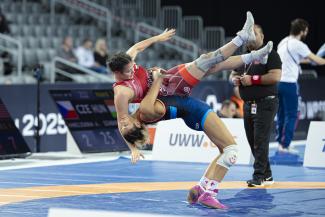BUDAPEST, Hungary (July 19) -- The Budapest Ranking Series enters day three with five Women's Wrestling weight classes and three Greco-Roman weight classes.
Till the World Championships, every competition will follow this rule for Greco-Roman
WATCH LIVE | LIVE MATCH ORDER | DAY 2 RESULTS
15:00: Another Hungarian Greco wrestler in the final as Darius Attila VITEK (HUN) pins Sarkhan MAMMADOV (AZE) in the semifinal. Marat KAMPAROV (UWW) beats Elias KUOSMANEN (FIN), 3-1 to book a place in the final against Vitek
14:45: It's Turpal BISULTANOV (DEN) vs David LOSONCZI (HUN) final at 87kg. Bisultanov beats Tamas LEVAI (HUN), 7-2, in the semifinal while Losonczi blanks Islam ABBASOV (AZE), 4-0.
14:35: Hasrat JAFAROV (AZE) drops his 72kg semifinal to Abdullo ALIEV (UZB), 5-3, and the Uzbekistan wrestler makes his way to the final. He will face Iuri LOMADZE (GEO) who beats Giorgi CHKHIKVADZE (GEO).
14:25: Aiperi MEDET KYZY (KGZ) suffers a upset loss to Thamires MARTINS (BRA) who beat the Kyrgyz 10-5 and enter the final. Martins will have PRIYA (IND) for the gold-medal bout.
14:15: Noemi SZABADOS (HUN) gives the local fans a huge moment to cheer by beating Brooklyn HAYS (USA) 10-0 in the 68kg semifinal. She will face Kennedy BLADES (USA) in the final after Blades beat Yuliana YANEVA (BUL) 6-2.
14:00: Irina RINGACI (MDA) takes less than a minute to gut-wrench Eniko ELEKES (HUN) and storm into the 65kg final. She will face Grace BULLEN (NOR) in the final after the Norwegian secured a come-from-behind fall over Macey KILTY (USA). Bullen was leading 6-5 before she tried a throw from bad position and conceded four points. Kilty had her in fall position but did not finish. Both tried a headlock in the second period and while Kilty scored four, Bullen scored reversal and kept the headlock to pin Kilty just in time.
Last time Ringaci and Bullen met, Bullen defeated the Moldovan.
13:50: Amina TANDELOVA (UWW) rolls to an 11-0 win over Krystsina SAZYKINA (UWW) in the first semifinal at 62kg. She will face Alina KASABIEVA (UWW) in the final after she defeated Ana GODINEZ (CAN) 12-9 in the other semifinal.
Semifinals will begin shortly
13:25: David LOSONCZI (HUN) uses all his strength to get past world U20 champion Islam YEVLOYEV (KAZ) and reach the 87kg semifinals. Yevloyev scored a suplex from par terre to lead 5-0 before Losonczi rallied back.
He scored a stepout and then from par terre, he scored a correct throw for two points. Yevloyev committed a foul and was docked two points. Losonczi ultimately won 9-5.
13:10: Hasrat JAFAROV (AZE) gets a correct challenge with 3 seconds left in the bout to win his 72kg quarterfinal against Merey MAULITKANOV (KAZ). Jafarov was down 3-3 on criteria but scored exposure points with 3 second left which were not awarded and Azerbaijan challenged.
12:55: Turpal BISULTANOV (DEN) with a first-period victory over Alan OSTAEV (UWW) to make it to the 87kg semifinal. A big four-pointer at the start and then scoring from par terre for the win for Bisultanov.
12:50: Ana GODINEZ (CAN) with a reversal takedown on Bilyana DUDOVA (BUL) after a scramble and Godinez scores a fall! What an incredible victory for Godinez after Dudova had taken a 4-4 criteria lead.
12:45: A fall for Aiperi MEDET KYZY (KGZ) over Dymond GUILFORD (USA) at 76kg with six seconds left. Guilford was leading 4-0 and but Medet Kyzy scores a takedown to cut it to 4-2 before getting Guilford on the mat and securing the fall
12:35: Grace BULLEN (NOR) survives a pin against Kadriy AKSOY (TUR) to recover and win 12-2 in her 65kg bout. That was really close for Bullen there.
12:20: Macey KILTY (USA) takes up all six minutes of her bout but manages to beat Aleah NICKEL (CAN) 10-0 at 65kg.
11:45: Marcel STERKENBURG (NED) got the first point against Islam ABBASOV (AZE) but then told the referee that he is unable to continue. He had suffered a rib injury at the Thor Masters.
11:40: Kennedy BLADES (USA) can't stop doing the suplex! She opens her Budapest campaign with a suplex, this time over Alina SHEVCHENKO (UWW) and then laces her for a 10-0 win in just over a minute at 68kg.
11:30: Turpal BISULTANOV (USA) with a correct throw from par terre and he easily manages to beat Bachir SID AZARA (ALG), 4-1, at 87kg.
11:20: Brooklyn HAYS (USA) with a takedown in the final 10 seconds to beat world champion Buse TOSUN (TUR) at 68kg, 6-5. Tosun really disappointed with that and takes her time to return to center
11:10: Ana GODINEZ (CAN), who will be in Zagreb for the World Championships, pulls off a 6-5 win over Adaugo NWACHUKWU (USA) at 62kg. Big win for Godinez over U.S. representative for the World Championships.
10:55: Aleksandr KOMAROV (SRB) and David LOSONCZI (HUN) are paired in the opening round at Greco-Roman 87kg. Losonczi gets the first par terre advantage but fails to turn. However, he had criteria having the first point. Losonczi scored a stepout to take a clear 2-1 lead and won.
10:40: Former world U23 champion Exauce MUKUBU (NOR) gets a turn from par terre and beats Payton JACOBSON (USA) 4-1 at 87kg to get things going.
10:30: Women's Wrestling in 55kg, 62kg, 65kg, 68kg, and 76kg and Greco-Roman 72kg, 87kg and 130kg in action in Budapest on Saturday.



Share your thoughts.
Comments